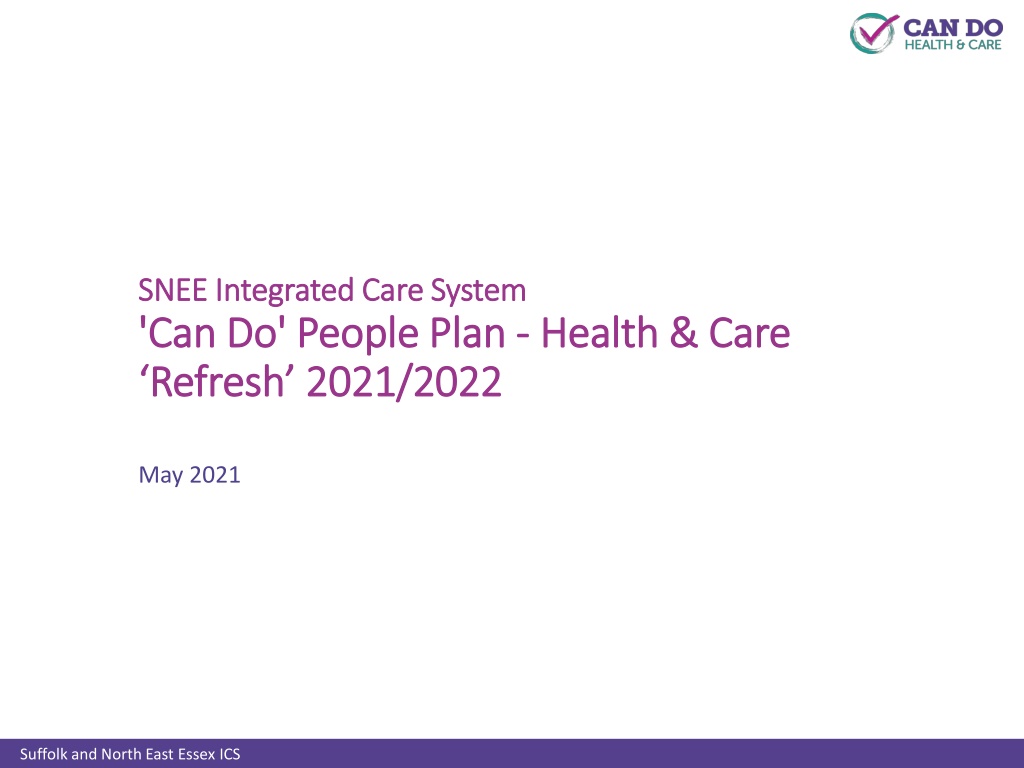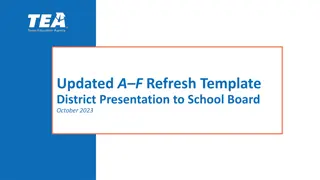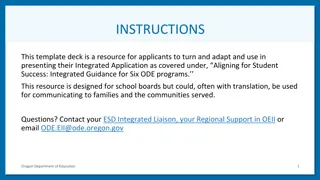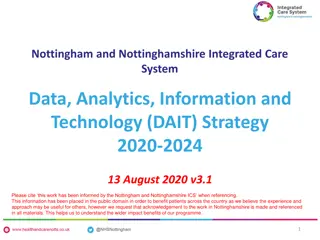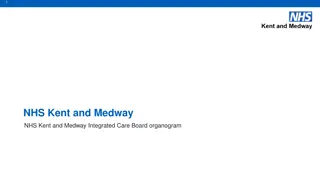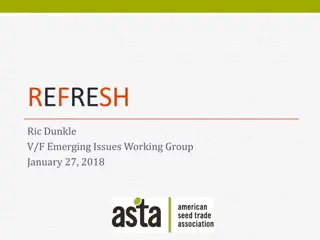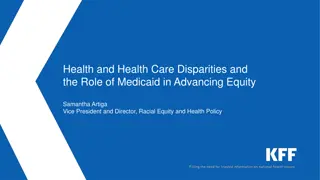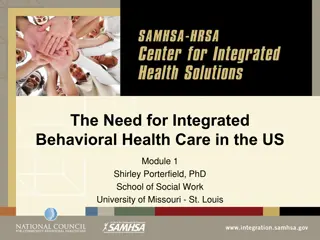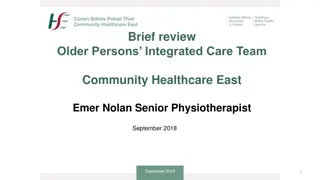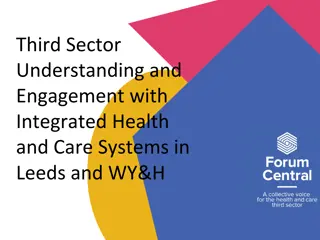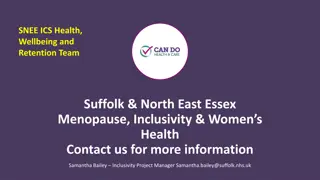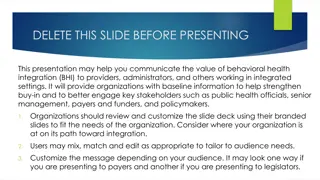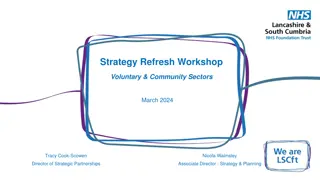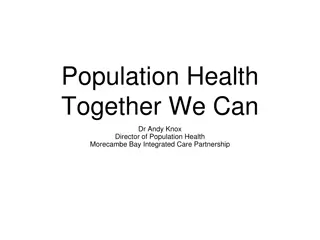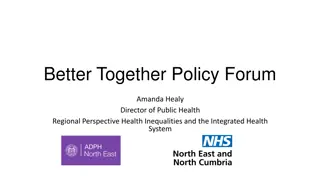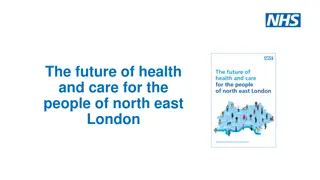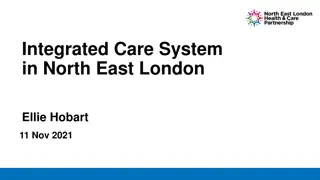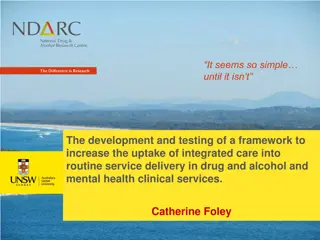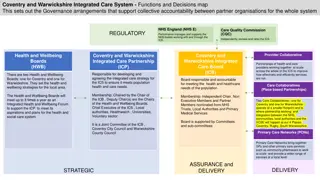SNEE Integrated Care System: People Plan and Health Refresh Overview
The SNEE Integrated Care System in Suffolk and North East Essex aims to be the best health and care system by 2025 through workforce development and strategic planning. The system focuses on increasing self-care, community-based care, and collaborative practices while addressing workforce challenges and promoting equality in health and care services. Various partner bodies and alliances work together to implement workforce strategies and improve overall health outcomes.
Download Presentation

Please find below an Image/Link to download the presentation.
The content on the website is provided AS IS for your information and personal use only. It may not be sold, licensed, or shared on other websites without obtaining consent from the author. Download presentation by click this link. If you encounter any issues during the download, it is possible that the publisher has removed the file from their server.
E N D
Presentation Transcript
SNEE Integrated Care System SNEE Integrated Care System 'Can Do' People Plan 'Can Do' People Plan - - Health & Care Refresh 2021/2022 Refresh 2021/2022 Health & Care May 2021 Suffolk and North East Essex ICS
Contents Contents Refresh 'Can Do' People Plan 1. Overview of SNEE as a system in terms of workforce 2. Alignment of People Plan, Operating Plan & SWIM 3. Overview of key deliverables 3 4 5 2 Suffolk and North East Essex ICS
Overview of SNEE as a system Overview of SNEE as a system - - workforce workforce Suffolk and North East Essex Best health and care system to work in and with by 2025 Draft V8 May 2021 System wide health & care goals Increase self care, independence & community based care Increased consistencies in working practices across the alliances via commitment & collaboration to work together Slow down demand at acute & specialist care through hospital reconfiguration & transformation SNEE Integrated Care System consists of three health alliances and other partner bodies that work with them, as shown below. Overall workforce principles to be established through the Can DoPeople Plan. Whole system approach adopting one workforcethinking implemented via the alliances to be tailored at place level and neighbourhoods. Strategic workforce principles for health and care from 2021 to 2022 SWIM model phase 2 and 3 completed, recommendations considered, accepted and implemented across the system. SNEE ICS adopts an agreed, flexible approach across the three alliances and partner bodies to grow our workforce, retain and develop our people and attract new people to work across the system, utilising the system level website to support our people. Reduce variation on how our people are trained across the system, working together with all the education providers. System approach via the implementation of the agreed SNEE apprenticeship strategy to encourage more young and older people new to health and care to take up apprenticeships to further their career pathways, utilising the SNEE We Can Do TogetherHealth and Care Academy. SNEE implement a system wide Primary Care Mentorship programme for people working in primary care. Further develop workforce planning within and across the alliances to identify gaps and workforce challenges. Implement system wide proactive approaches to address the workforce challenges, increasing associate level roles to address gaps in clinical posts. Working together with the volunteering organisations, community groups and social enterprises (VCSE) to help support and develop local people, making it easier to volunteer across the system e.g. volunteering passport. Reviewing existing and creating new roles in addressing inequalities in wellbeing, living standards, education, finance and supporting the delivery of health and care services across SNEE. Partners working with West Suffolk and Ipswich & East Suffolk alliances: Suffolk County, District & Borough Councils Suffolk Health & Wellbeing Board Suffolk LMC & LPC NSFT mental health provider Ipswich & East Suffolk Alliance Ipswich and East Suffolk CCG Population 412k 8 PCNs (compromising of 40 GP practices) Ipswich Hospital A&E services St Elizabeth Hospice West Suffolk Alliance West Suffolk CCG Population of 254k 6 PCNs established (comprising of 24 GP practices) West Suffolk NHS Foundation Trust providing hospital & community healthcare services St Nicholas Hospice Partners working with Ipswich & East Suffolk and North East Essex Alliances: East Suffolk & North Essex NHS Foundation Trust Acute and Community health care services for Colchester, Ipswich & local areas Voluntary Sector Organisations (total provider workforce 9.6k) East of England Ambulance Adult social care workforce - SNEE The total adult social care workforce working across SNEE using 2018/19 data was 29k North East Essex Alliance North East Essex CCG Population 356k 10 PCNs (compromising 32 GP practices) Colchester Hospital A&E services Anglian Community Enterprise Community Interest Company (ACE CIC) providing community health services Urgent Treatment Centres: Colchester and Clacton, Care UK providing OOH St Helena Hospice Partners working with North East Essex Alliance: Essex County, District & Borough Councils Essex Health & Wellbeing Board Essex LMC & LPC EPUT mental health provider Delivering against We Are the NHS People Plan Alignment of the Four Pillars Looking after our people Belonging in the NHS New ways of working Growing for the future Health & Wellbeing Guardians Health & safety e.g. system wide IPC programmes; Staff - Enhanced Occupational Health & Wellbeing service pilot & staff Mental health/wellbeing hubs; Consistent flexible working across alliances; and Retaining our people Thinking differently equality, diversity and inclusion; System level EDI focus group - psychological safety; Extending the SNEE mutual aid agreement across the system Continuing and coordinated front line engagement with our people e.g. WhatAreWeMissing Increasing skill mix across alliances and system; Developing, educating and training our people; Adopting consistent practices across SNEE supporting existing workforce to train others Adopting digital health & care pathways. Increasing number of clinical staff e.g. nurses, doctors, associate roles & support workers, upskilling staff to take new roles; System wide approaches to embed volunteers to health and care services; Consistent, effective & efficient recruitment practices, including returners, Health and Care Academy website We Can Do Together, accelerate apprenticeship strategy. SNEE commitments for our people working in Health and Care 3 Suffolk and North East Essex ICS
Alignment of our People Plan to Operating plan & SWIM Alignment of our People Plan to Operating plan & SWIM The outcomes and recommendations from the SWIM model will support the next steps for refining and further developing the 2021-2025 Can Do People Plan. This will include workstreams described in the recent ICS submission to the NHS Operating Plan. Looking after our people Belonging to SNEE Adopting new ways of working Growing for the future Continuously update and refine the system level Health & Wellbeing offer utilising the system We Can Do Together website. Adopt and implement Wellbeing strategies e.g. Primary Care Adopting Flexible working practices inc rotational opportunities. Staff mental health hubs Suffolk & Norfolk. System level Health and Wellbeing Guardians. Alliance and System level retention strategies focusing on moving forward through Covid-19. System level EDI focus group developing Inclusion Charter for providers to sign up to. Extension of MAA across system. Listening, coordinating, and engaging with front line staff. Leadership & resilience training programmes for line managers and team leaders adopting an inclusive culture. Implement pilots for seldom heard or hard to reach areas e.g. Medic Mentor, StreetDoctors and working with Princes Trust, initially in Tendering, and extending to other areas across SNEE. Creating new ways of working and service delivery by rolling out of Data, Digital & Technology workforce programmes e.g. RPA, eRosters, Digital Staff Passports. Service/professional level rotational programmes within and across providers. Review of current and new job roles, learning from the impacts of Covid-19 Identify new future ways of working trends in health and care. Socialise across all system partners the We Can Do Together Health and Care Academy website which is now live. Promoting and developing Strategic Workforce Planning. Growing clinical staff roles and associate/support roles. Upskilling staff to take on new roles e.g. New nurse endoscopists, Role out of apprenticeships e.g. Physio and OT rotational apprenticeships to grow and plan for our future workforce. SNEE to be the Best Health and Care system to work in and with by 2025 4 Suffolk and North East Essex ICS
Overview of key deliverables (1 of 4) Overview of key deliverables (1 of 4) The 'Can Do' approach for looking after our people will focus on retaining our valuable staff and people working across the three alliances within SNEE. Ensuring they continue to feel valued, identify and belong to our system, and continue to want to work within SNEE. Workforce information shows that for some of our providers vacancy levels (6.9%) and turnover rates (11.4%) are lower than others within the region. The impacts of working during Covid-19 may influence these and we need to explore how best to look after our staff and people within SNEE. No Key deliverables looking after our people Timeline 1 Expand at scale and share across health and care organisations the Mutual Aid Agreement (MAA) so suitable staff are able to work across health and care settings regardless of which organisation they are employed by. Q1 2 Work with system partners including Union representatives to further develop the MAA to support the endorsement of the document so that this can be used within the care sector. Scope how this tool can be adapted for volunteers working across SNEE. Q1 & Q2 3 Consolidate the health and wellbeing requirements and invest in system wide programmes which can be implemented quickly in the following weeks and months. This will include applying for system level external funding schemes, sharing good practices across organisations e.g. take a break culture , initiatives to mitigate and manage burnout, and new roles such as Wellbeing Guardians, Co- ordinators and developing new offers. These will support the resilience of staff and volunteers across SNEE. Q1 4a Consolidate NHS recruitment strategies, develop system wide approaches for SNEE for rapid recruitment. Goal to reduce the number of policies required and have one set of key recruitment policies across SNEE, linked to the NHS promise where relevant. Focus areas to include: Consistent salaries and AfC equivalent bands across the workforce; JDs/Personal specification consistent in particular Primary Care for clinical and non-clinical roles; Simplify applying for SNEE vacancies - One Click approach including consistent application process utilise social media adverts and use all recruitment platforms including NHSJobs; and Increase pipelines of encouraging external candidates to the workforce (recently unemployed social media presence / SEO / general communication. Q2 to Q3 4b Consolidate NHS retention strategies, develop system wide approaches for SNEE to retain our people including re-deployment. Encouraging and supporting more flexible ways of working within and across organisations. Goal to reduce the number of retention policies required and have one set of key policies across SNEE, linked to the NHS promise where relevant. Focus areas to include: Encourage secondment opportunities to support development of staff consistent processes across organisations; Increase partnership working with all providers and education providers to increase pipeline and succession planning; and Creation of talent pools and a leadership academy to support learning and development and career progression. Q1 & Q2 5 International recruitment consolidated in practices. Additional funding for Nursing and need medical funding and the implications for primary care. Q3, Q3, Q4 6 Flexible policies and procedures to be reviewed and simplified for staff working within NHS organisations. This will include blended approaches to working from home and new policies/procedures for staff working from home permanently. Prioritising the key ones for 2021 e.g. working from home. Q2, Q3 7 Collaborative working on initiatives to expand vaccinations, testing, risk assessments and obtain the relevant support when recovering from ill health. These will take place across the alliances and partner bodies. Linked to Health and Wellbeing. Q2, Q3 5 Suffolk and North East Essex ICS
Overview of key deliverables (2 of 4) Overview of key deliverables (2 of 4) The 'Can Do' approach for belonging to SNEE recognises the existing strong collaborative partnerships and relationships within and across alliances and providers. It acknowledges that further work is required to embed and expand these conversations and engagements at scale so staff and people working within and across SNEE are able to identify and understand the benefits to them, and the people they serve and support. Adopting an inclusive approach, 'Can Do' behaviours and celebrating diversity across the providers, alliances and system. No Key deliverables belonging to SNEE Timeline 8 System level strategy work for equality, diversity and inclusion to address the systemic inequality that is experienced by some staff including BAME staff. Consolidating the system level WRES data/information to support the strategy development. Q2, Q3. 9 Integrate workforce teams working across alliances and primary care to support the implementation of the Can Do People Plan. Q2, 10 Co-produce the SNEE Leadership Compact, for people in leadership positions, agreeing the types of positive behaviours expected and how to work together. To deliver the highest standards of care for our patients, service users and staff and making SNEE the best health and care system to work in and with by 2025. This will include the learnings shared during Covid-19. Q2, Q3 11 Test the development of the SNEE integrated health and care one workforce brand by engaging with front line staff across the system during summer/early autumn 2021 using a number of platforms, e.g. digital crowd sourcing platforms, webinars, surveys and working with union representatives. Building on the recent system level Retention task and finish group to be launched in May 2021 and workforce social media platform linked to the We Can Do Together website. Q2, Q3 12 Confirm the governance structure for the People Plan through the SNEE People Board, ensuring all system partners are represented. Agree the TOR for PB review date for April 2021 On-going 13 Develop system approaches to address the workforce needs across partners, ensuring staff on bank can access shift work across the system (using the MAA). This will include the training requirements and pay to work flexibly across organisations. This will support the reduction in agency spend and maintain the newly acquired skills from Covid-19. Q2, Q3 6 Suffolk and North East Essex ICS
Overview of key deliverables (3 of 4) Overview of key deliverables (3 of 4) The 'Can Do' approach for new ways of working across health and care will include creating new roles, pathways, working with volunteering partners and patient groups, and incorporate digital solutions in how care is delivered. Focusing on seldom heard groups for both services being delivered and for attracting new people to work in health and care sectors. Moving away from task oriented to outcome based care, actively disrupting the status quo and introducing new practices, roles and positive behaviours to deliver person centred care. No Key deliverables new ways of working Timeline 14 Continue developing blended and flexible roles (staff and volunteers), new roles e.g. mental health and primary care, and additional roles that can work across health and care. Q2, Q3, 15 Confirm the system level workforce planning resource required and build on system level workforce data/intelligence to deliver demand and capacity modelling to influence new ways of working & roles. Incorporating the apprenticeships and volunteering into workforce plans, and review existing roles that may need change or are no longer required, including lessons from Covid-19. Central function for data linked to the workforce observatory staff at region, need to check on care data and ensure this is linked with the workforce planning for the system. Q2, Q3 16 Develop digital transformation workforce programmes to stabilise, sustain and accelerate digital solutions to continue to deliver new ways working for staff, volunteers and people and families receiving care. Including digital solutions for recruitment of staff across the system and working with partners to share talent across the system. Q2, Q3 17 Working with existing or new focus groups to engage with seldom heard groups of both staff and those receiving care to adopt new practices and care pathways, working closely with the volunteering sector. Q3, Q4 18 Review the current ESR utilisation across the system linked to the MAA, focusing on health organisations first and scope options that can be used for care organisations. Supporting the Digital Staff Passport programme. Q3, Q4 19 Build on and adapt the existing workforce clinical reference group supporting new roles, transformation programmes, educational requirements for existing and new staff. Aligning the clinical, finance and workforce agendas across the system. Q3, Q4 7 Suffolk and North East Essex ICS
Overview of key deliverables (4 of 4) Overview of key deliverables (4 of 4) The 'Can Do' approach for growing for the future will focus on attracting people who have left health and care sectors and are willing and wanting to return with flexible practices and support. Attracting new people, actively encouraging them to apply for existing roles in health and care sector, growing our workforce by exploring the current and future gaps through system-wide workforce planning and actively working with education to encourage younger people to consider working in health and care sectors through the health and care academies. This will include people who had not previously considered working in these sectors. No Key deliverables growing for the future Timeline 20 Implement the five year system wide apprenticeship strategy across health and care sector, prioritising urgent agreements with system partners. Q2, Q3 21 Further develop and implement the Health and Care Academy Programmes across SNEE, prioritising the Tendring Workforce Academy. Working closely with schools and colleges to encourage people to apply for roles, access workforce opportunities within SNEE. Q2, Q3 22 Develop the Integrated Care Academy Centre of Excellence. Report to People Board Q3, Q4 23 Continue to develop the system wide Career and Recruitment website. 24 Build to develop a reservist model of people that have been trained and supported to return to practice, including those looking for work in the health and care sector due to unemployment in other industries. Identifying the gaps in current workforce and how they can be managed with this group of people. Q3, Q4 25 Review current education, training and upskilling requirements for existing and new people and agree at a system level how they will be met, utilising new ways of delivering them using digital offers and out of hospital and community placements. Q3, Q4 26 Growing our Nursing workforce - Our vision is to recruit/train a total of 150 nurse associate roles by March 2024 to deploy across inpatient settings. This will roughly equate to 1 NA per shift per ward. These will replace hard to recruit band 5 entry level roles. Upskill band 5 to 6 roles (inpatient settings) to support retentions plans Q3, Q4 27 Growing psychology - increase Clinical Psychology commissions by 10 Q4 28 Grow mental health workforce to meet increasing demands e.g. Clinical Associate Practitioner (CAP), Recruit to Train roles Q4 8 Suffolk and North East Essex ICS
